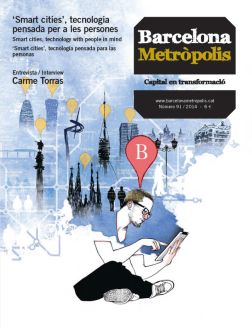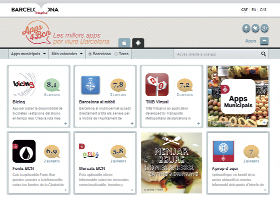Nowadays you do not touch a city, nor do you smell it. You live a smart city through your mobile phone. Smart cities are advancing unstoppably towards a not-too-distant future thanks to the development of apps that help the public to understand their environment.
Certain studies point out that the number of people who have a mobile phone has risen by 21%. Currently 80% of the population aged between 18 and 34 live their lives glued to these microcomputers and 46% of these young people access the internet from their mobile. Spain has the highest market penetration of any country in Europe, with 23 million people having smartphones and 22 million being active app users. They download four million mobile apps each day and the average number of applications per device is around 24 for smartphones and 31 for tablets. All this data demonstrates that the mobile ecosystem is healthier than ever and reinforces a change in the way we understand cities. Getting the inhabitants of smart cities more involved through smart technologies is the aim of many city councils, companies and institutions, who are developing systems to enrich the relationship between smart citizens and their environment and help them to interpret the flood of real-time data generated by a city. At the same time, they are trying to fight the digital divide that refuses to disappear.
The celebration of the Smart City Expo World Congress, the Mobile World Congress and the strength of the Barcelona brand has made the city a haven for mobile technologies, apps and data recycling. Barcelona City Council has launched the Barcelona a la butxaca (Barcelona in your pocket) project, a network of webs and apps that connect people to the city. “With Barcelona a la butxaca, from the moment you get up until the moment you go to sleep you can live the city through your mobile,” says Sergi Jerez, Executive Director of eAdministration of Barcelona City Council. Thanks to this initiative, new mobile technologies are planned for accessing the city’s services, stimulating industry to encourage the creation of quality jobs and catapulting Barcelona into a benchmark position in the field of smart cities. These applications enable you to check the weather, know if there are bikes available at the nearest stop, report incidents, go out running and see the closest circuits, or get a taxi and pay by contactless card, for example.
“A person that lives, works and spends their leisure time in the city has a huge number of apps to make their daily life easier,” explains Sergi Jerez. The number of mobile phone terminals is greater than the number of computers, data that suggest the general public does not need educating about the digital world, but instead needs tools to experiment and interact with the infrastructures in a completely different manner to the way they have done up to now.
Barcelona, mobile capital and promoter of the City Protocol, is now fourth in the 2013 Smart City rankings, ahead of Paris, Stockholm, Hamburg, Berlin, Helsinki and London, and behind Copenhagen, Amsterdam and Vienna. These rankings, sponsored by Co.Exist, highlight the public bike-hire service Bicing, the pollution detection and traffic management systems, and the 22@ district as strong points for the smart Barcelona, a city with strong links to design and quality. “From City Hall we also have the opportunity to link it to the words ‘smart’ and ‘technology’,” says Jerez.
Barcelona Corre, Mercats BCN, BCN Paisatge, Nit dels Museus, Barcelona Arquitectura and MobileBCN are some of the mGovernment initiatives of the City Council, which aims to promote its presence in the mobile channel and give added value to the local environment – a total of 35 published apps and more than 700,000 downloads. The Apps4bcn portal, presented during the Mobile World Congress 2012, collected together all the different tools that help us understand the city and encourage the use of mobile solutions, and which also make Barcelona a laboratory and a showcase encouraging internationalisation. “Sometimes in Google Market or the Apple Store it is difficult to find an app linked to the life of a city. At Apps4bcn we have set up 16 categories that more naturally relate to everything a citizen needs,” explains Sergi Jerez. “Here we offer public and private apps, the best in the city, free and non-corporate, and they are recommended by experts, not City Hall.” It is a meeting point where members of the public can play with and download the apps, get daily recommendations from infomediaries, interact with the public administration, and where the private sector can generate new initiatives. But even though the digital divide is getting ever smaller thanks to the proliferation of mobile devices, they are still too expensive and quickly become obsolete.
Digital identity in the cloud
Creating an efficient, sustainable and effective administration that enables a more natural and simple relationship with the public has led the City Council to set up the MobileBCN system, a mobile application available for iPhone and Android that allows any smartphone user connected to the internet to request and use their digital identity. As part of 2013 Smart City Expo, the City Council presented this new method of digital certification that provides access to various procedures, including the municipal register, vehicle tax (IVTM), the municipal tow-away and the Citizen’s File, and to which they will gradually add further services. “In the future, these procedures and services will be extended to those of companies and private entities,” comments Manel Sanromà, who led the development of this application from the City Council. He adds that the ease and portability of mobile phones facilitates access by more users, thereby helping overcome the digital divide. Being able to prove who we are digitally has, however, fed the debate on data security in the cloud, demonstrating that there is still much work to be done in this field.
But how are private initiatives generated in a smart environment? Barcelona City Council believes in reusing data and providing tools for companies and other institutions looking for an opportunity in this area, either for data-driven journalism or developing new initiatives. Through the Open Data BCN portal, public sector information in digital, standardised and open format has been made available to everyone. The general public, companies and institutions have free access that allows them to get information and create new services, increasing their social and commercial value – one way to give back to society public data that is not legally restricted and encourage its use.
The aims are to increase the transparency of the local authority, identify the needs of society, encourage new initiatives and the reuse of data and promote the economic fabric, i.e. open up access to data and generate a dialogue between supply and demand. “It is important to have an ecosystem of infomediaries, people who work with information,” states Sergi Jerez. “Collaboration between the public and private sector is essential for developing smart-city projects.”






